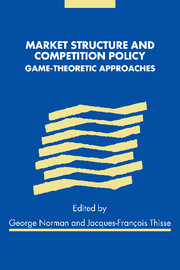Book contents
- Frontmatter
- Contents
- List of figures
- List of tables
- List of contributors
- Louis Phlips: a brief biography
- Introduction
- 1 Competition policy and game-theory: reflections based on the cement industry case
- 2 Legal standards and economic analysis of collusion in EC competition policy
- 3 A guided tour of the Folk Theorem
- 4 Predatory pricing and anti-dumping
- 5 Should pricing policies be regulated when firms may tacitly collude?
- 6 Tougher price competition or lower concentration: a trade-off for anti-trust authorities?
- 7 The strategic effects of supply guarantees: the raincheck game
- 8 Product market competition policy and technological performance
- 9 On some issues in the theory of competition in regulated markets
- 10 Modelling the entry and exit process in dynamic competition: an introduction to repeated-commitment models
- 11 Coordination failures in the Cournot approach to deregulated bank competition
- 12 How the adoption of a new technology is affected by the interaction between labour and product markets
- Index
Introduction
Published online by Cambridge University Press: 22 September 2009
- Frontmatter
- Contents
- List of figures
- List of tables
- List of contributors
- Louis Phlips: a brief biography
- Introduction
- 1 Competition policy and game-theory: reflections based on the cement industry case
- 2 Legal standards and economic analysis of collusion in EC competition policy
- 3 A guided tour of the Folk Theorem
- 4 Predatory pricing and anti-dumping
- 5 Should pricing policies be regulated when firms may tacitly collude?
- 6 Tougher price competition or lower concentration: a trade-off for anti-trust authorities?
- 7 The strategic effects of supply guarantees: the raincheck game
- 8 Product market competition policy and technological performance
- 9 On some issues in the theory of competition in regulated markets
- 10 Modelling the entry and exit process in dynamic competition: an introduction to repeated-commitment models
- 11 Coordination failures in the Cournot approach to deregulated bank competition
- 12 How the adoption of a new technology is affected by the interaction between labour and product markets
- Index
Summary
In his doctoral thesis published in 1962, Louis Phlips argued that European firms in the cement industry attempted to coordinate their actions by using basing-point pricing systems and more or less formal agreements about geographical markets. At the time that Louis was formulating his ideas, European competition policy was still in its infancy. It is perhaps no surprise that those who were formulating policies at that time paid little attention to the work of a doctoral student. It is somewhat ironic that these have come to centre stage at the end of Louis' distinguished academic career. It is also amusing to note that after a long and productive detour through consumption analysis, applied econometrics and industrial economics, Louis himself has chosen to return to his original love as shown by his Competition Policy: A Game-Theoretic Perspective.
Game-theoretic methods are now indispensable in the design, formulation and testing of competition policy in Europe and anti-trust policy in the United States. Until very recently, the connection was from market structure through market behaviour, as explained by game-theoretic tools, to competition policy. We can see this timeline, for example, in the formulation of merger policy and policies with respect to cartels. What is new is the realisation that this is a two-way street. Just as market structure affects competition policy, competition policy equally affects market structure.
- Type
- Chapter
- Information
- Market Structure and Competition PolicyGame-Theoretic Approaches, pp. 1 - 8Publisher: Cambridge University PressPrint publication year: 2000



